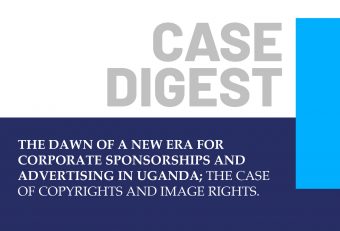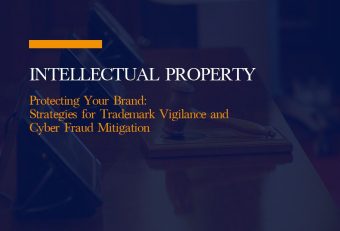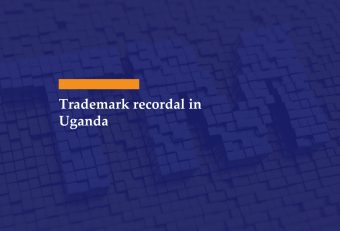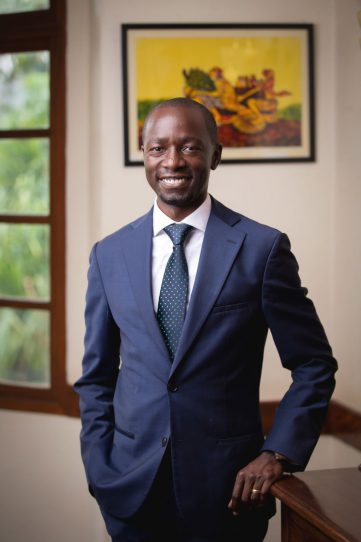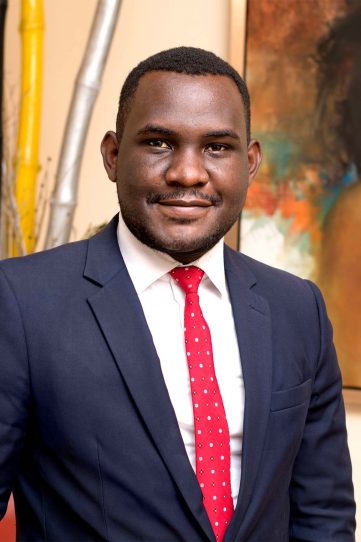Intellectual Property
Welcome to our Intellectual Property Law practice where we provide expert guidance to both local and international clients on a wide range of intellectual property matters. Our dedicated team offers comprehensive services encompassing the registration and protection of trademarks, service marks, copyrights, and patents. Additionally, we specialize in representing clients in opposition proceedings before the Intellectual Property Registry and Courts of Law.
In today's dynamic digital landscape, characterized by rapid technological advancements, the importance of intellectual property protection has never been more critical. The emergence of the digital economy has ushered in new challenges, making it essential for businesses to safeguard their intellectual assets effectively.
At Kampala Associated Advocates, our experienced trademark lawyers are at the forefront of this evolving landscape, assisting clients in safeguarding their trademarks and reputations online. We provide strategic counsel to mitigate risks associated with cyber threats, domain squatters, and domain name theft, ensuring that our clients' online presence remains secure.
Our approach combines innovative digital strategies with traditional enforcement methods to deliver tangible results for our clients. By leveraging our expertise in trademark and copyright enforcement, we provide tailored solutions that address the unique needs of each client.
Whether you are a Startup seeking to protect your brand identity or an established corporation navigating complex intellectual property issues, our team is here to support you every step of the way. With a deep understanding of Ugandan Intellectual Property Laws and Regulations, we are committed to helping you achieve your goals while safeguarding your valuable intellectual assets.
Contact us today to learn more about how our Intellectual Property Law practice can empower your business and protect your intellectual property rights in an ever-changing digital landscape.
Milestones
- We recovered a domain name from fraudsters, on behalf of Speke Hotel (1996) Ltd, who had registered a misleading domain name and we pursued the Complaint with the World Intellectual Property Organization (WIPO) Arbitration and Mediation Center (the Center) pursuant to the Uniform Domain Name Dispute Resolution Policy (the Policy) approved by the Internet Corporation for Assigned Names and Numbers (ICANN).
- We successfully defended against a claim for trademark infringement in which Kyaninga Royal Cottages (“our Client”) had been sued for using a name alleged to be similar to that of Kyaninga Lodge. It was our argument that the name/mark was a geographical indicator that could not be exclusively owned by the Claimant.
- We are currently opposing the registration of the mark KILIMO CALL CENTER due to its similarity with our Client’s mark “KILIMO TRUST”.
- We have represented Hewlett Packard at the Court of Appeal in an appeal lodged by China New Future Company against the judgment of the High Court of Uganda in Kampala, in Civil Suit No.97 of 2013 in which China New Future was found to have infringed on Hewlett Packard’s registered trademarks and an injunction had been issued against the infringing company on top of an order for the seizure and delivery up of the counterfeit goods for destruction.
- We successfully represented Orion Holdings (a Korean company) in the High Court of Uganda and successfully obtained an Order of Court to cancel an infringing trademark that had been registered by a different Chinese Company in Uganda.
- We routinely register various local and International trademarks at the Trademark Registry in Uganda on behalf of a number of companies.
- We provide ongoing support for trademark renewals and maintenance to ensure that our clients’ trademark rights remain valid and enforceable.
- We have also registered and renewed various foreign marks at the African Regional Intellectual Property Organization (ARIPO) and at the World Intellectual Property Organization (WIPO) on behalf of a number of foreign companies.
Articles on Intellectual Property
Intellectual Property related FAQs
In Uganda, the trademark registration system operates on a single-class application basis. This means that if an applicant wishes to register the same trademark across multiple classes of goods or services, they must file separate applications for each class. Each application is treated as distinct and requires its own set of documentation and fees.
This approach is outlined in the Trademarks Regulations, 2012, which state:
"An application for the registration of the same mark in different classes shall be treated as a separate and distinct application..."
URSB
Therefore, businesses seeking comprehensive protection for their trademarks across various categories must be prepared to manage multiple applications, each corresponding to a specific class of goods or services.
Uganda follows the first to file, and not the first to use system. While prior use can establish certain informal rights such as the right to claim the tort of passing off, formal registration of a trademark with the Uganda Registration Services Bureau (URSB) provides significant legal advantages. Registration offers public notice of ownership and enhances the ability to enforce rights against infringers. Therefore, securing formal registration is a prudent step to solidify and protect one's trademark rights.
Yes, you can sue someone for using your trademark in their website domain name, provided certain legal conditions are met. This is often considered a form of trademark infringement or cybersquatting, depending on the circumstances.
Trademark infringement
If someone uses your trademark in their domain name without authorization, it may amount to trademark infringement if:
• The domain name is identical or confusingly similar to your registered trademark.
• The use of the domain name creates a likelihood of confusion among consumers.
• The domain name is being used to compete unfairly, mislead customers, or dilute your brand.
In Uganda, trademark infringement claims can be pursued under the Trademarks Act, 2010, which protects registered trademarks against unauthorized use.
Cybersquatting
Cybersquatting occurs when someone registers a domain name containing your trademark in bad faith, such as:
• Attempting to sell the domain to you or a competitor at an inflated price.
• Using the domain to divert traffic to their site, harming your business.
• Exploiting your trademark's reputation for personal or commercial gain.
Internationally, this issue is also addressed by the Uniform Domain-Name Dispute-Resolution Policy (UDRP) under the Internet Corporation for Assigned Names and Numbers (ICANN).
An industrial design refers to the aesthetic or ornamental aspects of a product. It includes features such as the shape, pattern, color, or texture of an article, which give it a distinctive appearance. Industrial designs do not cover the technical or functional aspects of the product but focus solely on its visual appeal.
In Uganda, the protection of industrial designs is governed by the Industrial Property Act, 2014, which aligns with international standards under the Agreement on Trade-Related Aspects of Intellectual Property Rights (TRIPS).
Requirements for Protection as an Industrial Design in Uganda
To qualify for protection under Ugandan law, an industrial design must meet the following requirements:
1. Novelty
• The design must be new, meaning it has not been disclosed to the public anywhere in the world before the date of application or priority date. A design is not considered new if it is identical to or closely resembles an existing design.
2. Originality
• The design must be original and the result of the creator's independent intellectual effort. It should not be a copy or imitation of existing designs.
3. Visual Appeal
• The design must have a distinctive visual appearance. It is the aesthetic feature that makes the product appealing and recognizable.
4. Applicability to an Article
• The design must be applied to a tangible product. Abstract designs without application to a physical article cannot be protected.
5. Industrial Application
• The design should be capable of being reproduced through industrial processes. This means the design can be manufactured or applied to multiple copies of the product.
6. Not Contrary to Public Order or Morality
• The design should not offend public morals or contravene public order.
Application: Submit an application to the Uganda Registration Services Bureau (URSB), including:
i. A completed application form.
ii. A clear representation of the design (drawings, photographs, or samples).
iii. A description of the design and its application to the product.
Examination: The application is examined to ensure compliance with legal requirements.
Publication and Opposition: The design is published in an official gazette to allow for opposition by third parties.
Registration and Certificate: If the design meets all requirements, it is registered, and the owner receives a certificate of registration.
The Patent Cooperation Treaty (PCT), established in 1970 and administered by the World Intellectual Property Organization (WIPO), facilitates the process of seeking patent protection for inventions across multiple countries. By streamlining the patent application process, the PCT provides significant benefits for inventors, businesses, and patent offices worldwide.
